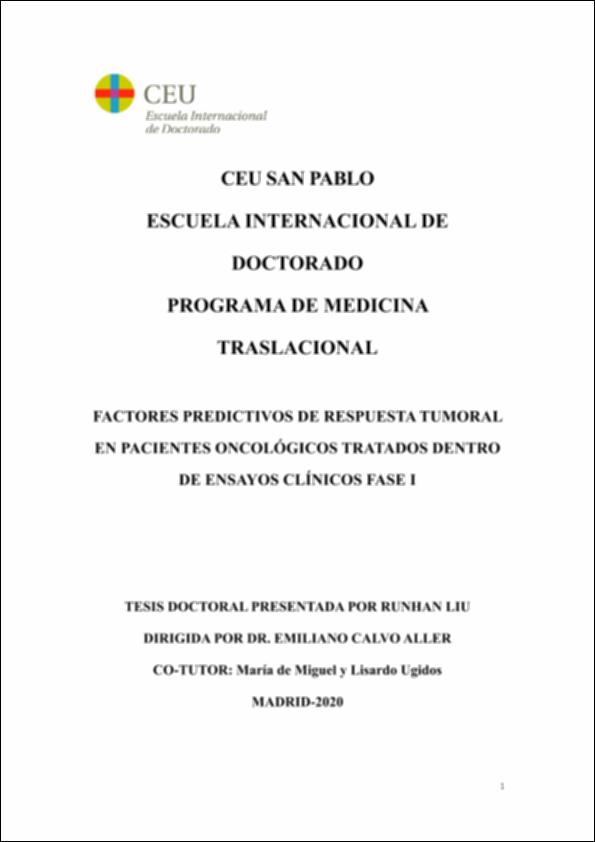Please use this identifier to cite or link to this item:
http://hdl.handle.net/10637/13017Factores predictivos de la respuesta tumoral en pacientes oncológicos tratados dentro de ensayos clínicos Fase I.
| Title: | Factores predictivos de la respuesta tumoral en pacientes oncológicos tratados dentro de ensayos clínicos Fase I. |
| Authors : | Liu, Runhan |
| Keywords: | Ensayo clinico de fase 1; Índice predictiva; Respuesta objetiva; Supervivencia global; Phase 1 trial; Predictive score; Objective response; Overall survival |
| Abstract: | El objetivo principal de los ensayos fase I es determinar la dosis recomendada para el ensayo fase II basado en la aparición de las denominadas toxicidades limitantes de dosis, mientras se minimiza el número de pacientes expuestos a dosis subterapéuticas o toxicidad severa. La selección de pacientes para la fase I es un componente clave de cualquier diseño de ensayo clínico.
Es un estudio retrospectivo que analizó 773 paciente con tumores sólidos avanzados o metastásicos, tratados en 85 ensayos en START-Madrid entre 2008-2016, se analizaron la relación con la respuesta objetiva. Primero se realizó un análisis univariante de las variables anteriores asociadas a respuesta objetiva. Aquellas variables estadísticamente significativas por chi-cuadrado (p <0.05) se incluyeron en el análisis multivariante de regresión logística escalonada. Se encontraron estadísticamente significativos que el índice de masa corporal por encima 25, menor 3 líneas previas y los niveles normales de fosfatasa alcalina son positivamente con respuesta radiológica. Se generó un índice START utilizando estos tres factores independientes, una puntuación de 0-1 se asocian a una mejor tasa de respuesta objetiva y una mejor supervivencia global.
El índice START-Madrid predictivo permitiría una mejor selección de pacientes. Phase I trials aim to determine the maximum-tolerated dose of a particular drug while minimizing the number of patients exposed to either sub-therapeutic doses or severe toxicity. Thus, patient selection for phase I trials is a key component of any clinical trial design. Though several studies have been made to address this issue, patient selection still represents a major clinical challenge.28 baseline clinical and analytical characteristics of 773 patients treated in phase I trials between 2008 and 2016 in START Madrid-CIOCC were analyzed and correlated to objective response (OR), median overall survival (OS), toxicity and treatment type. The ones associated to OR in the univariate analysis were included in the step-wise logistic regression multivariate analysis. The statistically significant ones were included in a predictive score (named here as the START-CIOCC score) of antitumor activity. Results: Body Mass Index (BMI)>25kg/m2 (p=0,021), two or less previous lines of treatment (p=0.002) and normal levels of alkaline phosphatase (ALP) (p=0.012) were found to positively correlate to radiological response. A START-CIOCC score was generated using these three factors as predictive parameters: compared to a score of 2–3 (where 2 or 3 of these variables are altered), a score of 0–1 is associated with longer survival time (11.6 vs 8.6 months; p=0.005) and overall response (17% vs. 7.6%; p=0.003). Conclusion: The prognostic START-CIOCC score, based on the BMI, number of prior lines of treatment and ALP levels, could be used to accurately select patients that would benefit from oncology phase I clinical trials. |
| Description: | Tesis-CEINDO, Universidad San Pablo CEU, Programa en Medicina Traslacional, leida el 24 de junio 2021 |
| Director(s): | Calvo Aller, Emiliano |
| URI: | http://hdl.handle.net/10637/13017 |
| Rights : | http://creativecommons.org/licenses/by-nc-nd/4.0/deed.es |
| Issue Date: | 21-Sep-2021 |
| Center : | Universidad San Pablo-CEU |
| Appears in Collections: | Medicina Traslacional |
Items in DSpace are protected by copyright, with all rights reserved, unless otherwise indicated.


